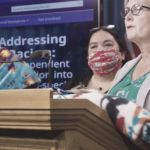In keeping with the theme of reconciliation and survivors of residential schools, as well as their children, families and generations that follow, I wanted to present a compilation of words spoken from those most affected. I felt the most important piece that I wanted to show to everyone who would see this is the strength and resilience that is a common theme in all the stories that I read from the Mi’kmawey Debert Cultural Centre website. Within each story, there was survival and determination to move forward and to find a path towards hope and new beginnings. They was rejuvenation in spirit and courage to hold onto the tradition, culture, crafts, values and teachings that were stripped away by residential schools.I wanted each person to have a voice and that voice to be heard.
The song I chose for my presentation is called “Is sorry enough”, written and performed by Murray Porter and Elaine Bomberry, about residential schools. This song was played at the 2012 Juno award and brought the audience to their feet in applause. The song brought tears to my eyes as you can feel the emotion in his voice as he sings the lyrics.
I chose the images that resounded with me as strong, cultural, spiritual and traditional. I wanted each story to have its own image and each image to have meaning. I wanted each photo to portray vision and hope as well as strength and resiliency.
“The closest translation of ‘resilience’ is a sacred word that means ‘resistance’,resisting bad thoughts, bad behaviours. We accept what life gives us, good and bad, as gifts from the Creator. We try to get through hard times, stressful times, with a good heart. The gift [of adversity] is the lesson we learn from over coming it”. (James Clairmont in LaFramboise et al., 2006, p. 194).
AnneMarie Tosh
References
Vukic, A., Gregory, D., Martin-Misener, R., & Etowa, J. (2011) Aboriginal and western conceptions of mental health and illness. Pimatisiwin: A journal of Aboriginal and Indigenous Community Health, 9(1), 65-86.





